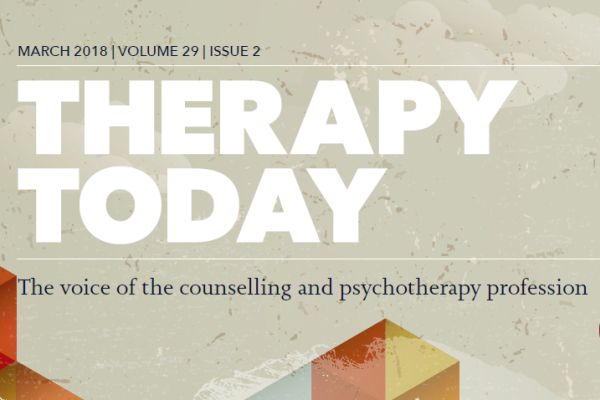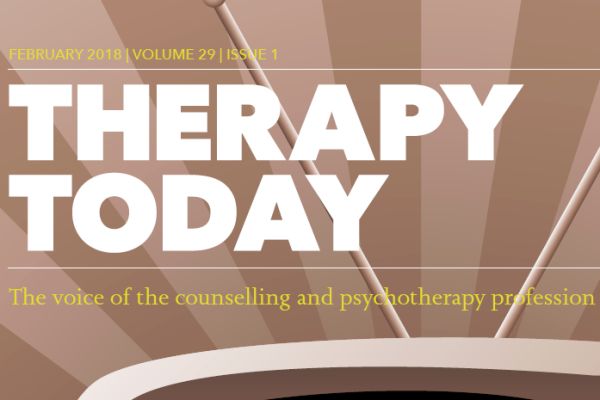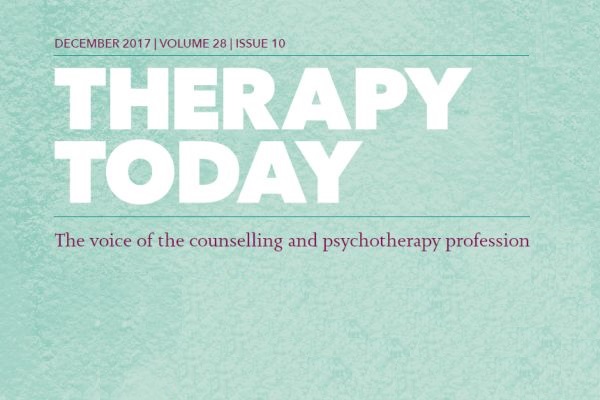‘We are recruiting for a fully qualified honorary counsellor to support homeless people. All applicants must be qualified to a minimum of diploma level.’
So reads a job advert from a recent issue of Therapy Today. ‘Honorary’, of course, is the posh word for ‘unpaid’. These kinds of adverts were not uncommon in the classified section of the magazine, but will no longer appear, after a members’ resolution to ban the promotion of unpaid positions for qualified counsellors was passed at the 2017 AGM. Says counsellor Siobhain Crosbie, who proposed the resolution with other members of Counsellors Together, a group campaigning ‘to end the culture and prevalence of unpaid work’: ‘When a counsellor is qualified, why should they be expected to work for nothing? Once qualified and not fulfilling training requirements, all counsellors engaged by organisations should be paid sessional fees, in line with local charges.’
BACP data from its surveys of members’ employment status show a trend for fewer counsellors to be working in paid employment and more members to have portfolio careers. In 2009, 37% of BACP members described themselves as mainly employed. This had dropped to 25% in 2017, and only 14% described themselves as solely employed. More than one in three (37%) described their employment as ‘mixed’, combining part-time employment or self-employment with volunteering.
Qualified versus competent
In 2014, 49% of members said finding paid work was their biggest challenge – a situation that is likely, if anything, to have worsened. For an increasing number of members, the solution has been to go straight into private practice after qualifying – membership of the Private Practice division continues to rise steadily. But should the profession regard the period immediately after qualification as a continuation of the training process – a stage when we need metaphorical ‘P’ plates, like a newly qualified driver?
‘I don’t agree that the minute you qualify you should be paid. There is often unconscious ignorance at that stage – people don’t know what they don’t know,’ says counsellor Roslyn Byfield. She suggests that newly qualified counsellors should consider holding onto their ‘day jobs’ – non-counselling work – to support them while they carry on volunteering to gain experience in counselling. ‘It’s a complex issue and there is no easy answer, but I believe that qualification is just one stage on the journey to becoming a therapist, not the end. If you continue with your placement after qualifying, you continue to be supported and your work will be overseen. It concerns me that people are not prepared to do this and, instead, they leave their placement and go straight into private practice, where we work mostly one-to-one. Even with supervision, there is no check in private practice that we are always helping people.’
Jeremy Clarke, a senior accredited counsellor and honorary fellow of BACP, made a similar argument against the resolution at the AGM. He advises counsellors not to throw themselves in the ‘deep end’ of paid work too soon. ‘There is much to gain from continuing to volunteer during the period after qualification; people should not feel that they have to rush through it. It is a vital part of professional development. The kind of support and mentoring that surrounds placements is very different to that available in paid employment. Paid contracts do not operate in the same way and counsellors may find themselves feeling unsupported.’
Accreditation standard
Post-qualification honorary positions are often advertised as opportunities for counsellors to build up their clinical practice hours towards accreditation. Although originally devised as a gold standard to mark experienced practitioners, in recent years accreditation has come to be seen by many employers as a minimum standard.
Geraldine Dufour, chair of BACP Universities and Colleges division, and Head of Cambridge University Counselling Service, says that many university counselling services would not recruit a counsellor for a paid role who was not BACP accredited. ‘There are so many different training courses for counselling at different levels and with different standards. When you have people who are BACP accredited, you know they have a minimum of 450 hours of experience, and that they have done enough training to meet BACP requirements. It really is a quality assurance for an institution.’
But Siobhain Crosbie argues that accreditation is a false benchmark. ‘Volunteering for an extra year or more to get enough hours for accreditation does not guarantee that you automatically become an effective, ethical counsellor. All it says about you is that you were in a financial position to be able to work for free. As a profession, we need to fight against the misconception that if you are not accredited you are not a good counsellor, and if you are accredited you are guaranteed to be a good counsellor. It’s supposed to be an individual choice whether or not to go for accreditation, but in practice there is no choice, because 99% of job adverts ask for accreditation.’
Looks good on the CV
It’s also hard to get even shortlisted for a job without relevant experience, whether that is in paid or unpaid posts. ‘Personally, I think it’s experience rather than qualifications that people look for when you go for job interviews,’ says Andy Bateman, counsellor and lecturer at Bradford University. ‘The voluntary work I did for a year after qualifying, working with male survivors of sexual abuse in prison, was the making of my career. I did come to resent not being paid, and financially I was at a low ebb. I was also frustrated that the mental health of prisoners was not valued enough to pay me for the work I was doing with prisoners at high risk of suicide. But it helped my CV stand out and showed my ability to work at the “heavy end”, and when I went for my first paid job, working for a college counselling service, I got it.’
Experience is crucial in a competitive job market, and being kept on by your training placement post-qualification, even if it is unpaid, can carry kudos, says Dufour. ‘It is a sign that your organisation valued your input enough to keep you on, and that can help you if you are then applying for paid work. Our trainees are given an initial one-year contract and then may be invited to apply for a second year. Not all trainees are kept on – it is based on merit. They continue on a volunteer basis but are also offered paid locum work when available.’ She points out that the BACP Good Practice in Action guidance for university and college counselling services recommends that honorary and trainee counsellors make up no more than 30% of the staff. ‘Universities should also offer them free supervision and provide ongoing mentoring, as well as selecting less complex clients to work with them. It does support the counsellors into building their careers,’ she says.
Not every voluntary counsellor sees unpaid work as a means to an end. Some do the work because they want to give, or give back, or because of their personal and professional values. Andy Bateman says he is likely to return to voluntary work after retirement. ‘I think there will come a point when I have not got a formal job anymore and I will be supplementing my pension with a bit of private practice and also doing some voluntary work, following my values. The work brings meaning.’
Crossing the line
Many counsellors work unpaid in the third sector so a charity can provide free or low-cost counselling for clients who cannot afford to pay. They are, effectively, subsidising the service for people on low incomes by their own free labour. Jeremy Clarke is a trustee for Albany Trust, a charity proving low-cost psychosexual counselling for the LBGT community. He says the service would not be viable without volunteers. ‘We would have to charge higher client fees, which would exclude those who couldn’t afford to pay. We get referrals from IAPT services and mental health teams as they can’t offer what we do.’
This is not exclusive to counselling. According to a 2017 survey by New Philanthropy Capital, two-thirds of charities say they have to use money from donations to deliver contracts for public services that are free at point of delivery, like the NHS.1 Over half the charities surveyed said they had turned down contracts because they did not think they could deliver a quality service on the funding offered. According to a 2016 report by Charity Finance Group,2 many charities struggle to recover the costs of delivering public sector contracts, with large organisations more likely to report a loss.
But are counsellors then effectively making up for the national shortfall in NHS counselling services and the underfunding of the NHS? And what if unpaid counsellors are working in services, whether in the third or independent sectors, that have been contracted by the NHS to provide, say, local IAPT services? Says Jeremy Clarke: ‘We do hear of organisations who have got into the NHS space and are responding to huge pressure on numbers by using unpaid counsellors to deliver counselling without proper support or supervision, or on contractual terms that are exploitative. That kind of experience is harmful to their professional development, as well as unsafe for NHS patients.’
Carolyn Mumby, Chair Elect of BACP Coaching and a BACP-registered counsellor, has run inner-city voluntary sector projects working with young people that used volunteer counsellors on placement. ‘Many of the young people were struggling with complex problems to do with both living in poverty and experiencing trauma. We provided the service largely through trainees on the second year of their course and unpaid, newly qualified counsellors. We ensured that good supervision was in place and followed good practice guidelines, but it can be tempting for an inexperienced counsellor to carry on in situations where someone with more experience may have recognised that they were at the limits of their competence,’ she says.
Concern for the future
Carolyn Mumby worries that we are in danger of creating a ‘two-tier’ system for counselling: ‘Those who can afford to pay have access to the most experienced counsellors working in private practice, but those who can’t, many of whom have severe problems and life challenges, are seen in “low-cost” services by less experienced counsellors. Someone who is relatively new may not be lacking in commitment or conscientiousness, but just not have the experience and self-awareness needed to work effectively with those made very vulnerable by their circumstances.
‘Imagine if we had a two-tier system for doctors – those who could afford to pay saw the most experienced medics, but those with fewer resources were seen by those not yet or just qualified,’ she says. ‘The fact that a service wouldn’t exist without voluntary counsellors should not mean that we accept the situation. We need to be campaigning more fiercely for counselling services to be properly funded.’
Recognising the value of ‘on the job’ experience, and the role it plays in developing competence reflects counsellors’ commitment to working ethically and effectively. But do we have to accept that this experience is often gained at our own expense? Teachers, nurses and social workers expect to go straight into paid work after qualifying, even if it’s in probationary roles where they are monitored and supported, and with a lower starting salary.
In the 2014 BACP survey, just over half of all members (54%) said they were concerned about future employment, rising to 69% of those who were in volunteer roles. Those working unpaid were also the least satisfied with their professional life.
‘Voluntary work is, in part, a symptom of the problem rather than a problem itself,’ says BACP Chair Andrew Reeves. ‘The problem is our lack of standardised training, and lack of clarity for employers about what they can expect in terms of training and experience when employing counsellors. Until we can say, with a supporting evidence base, this is what a counsellor is, with clearly benchmarked levels set against national standards, it makes it harder to challenge the market and benchmark employment against allied professionals such as social workers, nurses and teachers.’
In the meantime, voluntary work remains a complex issue that provokes very different views and conflicting emotions. We may value the experience we gain from an unpaid post, yet also feel exploited or that our time is taken for granted. And no matter how committed we may be to giving back, it’s hard not to question how ‘voluntary’ the decision to work for free can ever be when volunteering seems to be the only route to paid employment.
Sally Brown is a counsellor and coach in private practice (therapythatworks.co.uk), a freelance journalist, and Executive Specialist for Communication for BACP Coaching.
More from Therapy Today

Going it alone
Free article: For many counsellors, private practice is their only option if they are to earn a living. What do you need to know to do it safely and effectively? Sally Brown finds out from those who have made it work. Therapy Today, March 2018

Strictly therapy?
Free article: Sally Brown explores the growing phenomenon of broadcast therapy. Therapy Today, February 2018

Putting gender on the agenda
Free article: At long last, the counselling professions are embracing gender diversity. Catherine Jackson reports. Therapy Today, December 2017
References
1. www.thinkNPC.org/StateoftheSector
2. bit.ly/1rtZTiC
